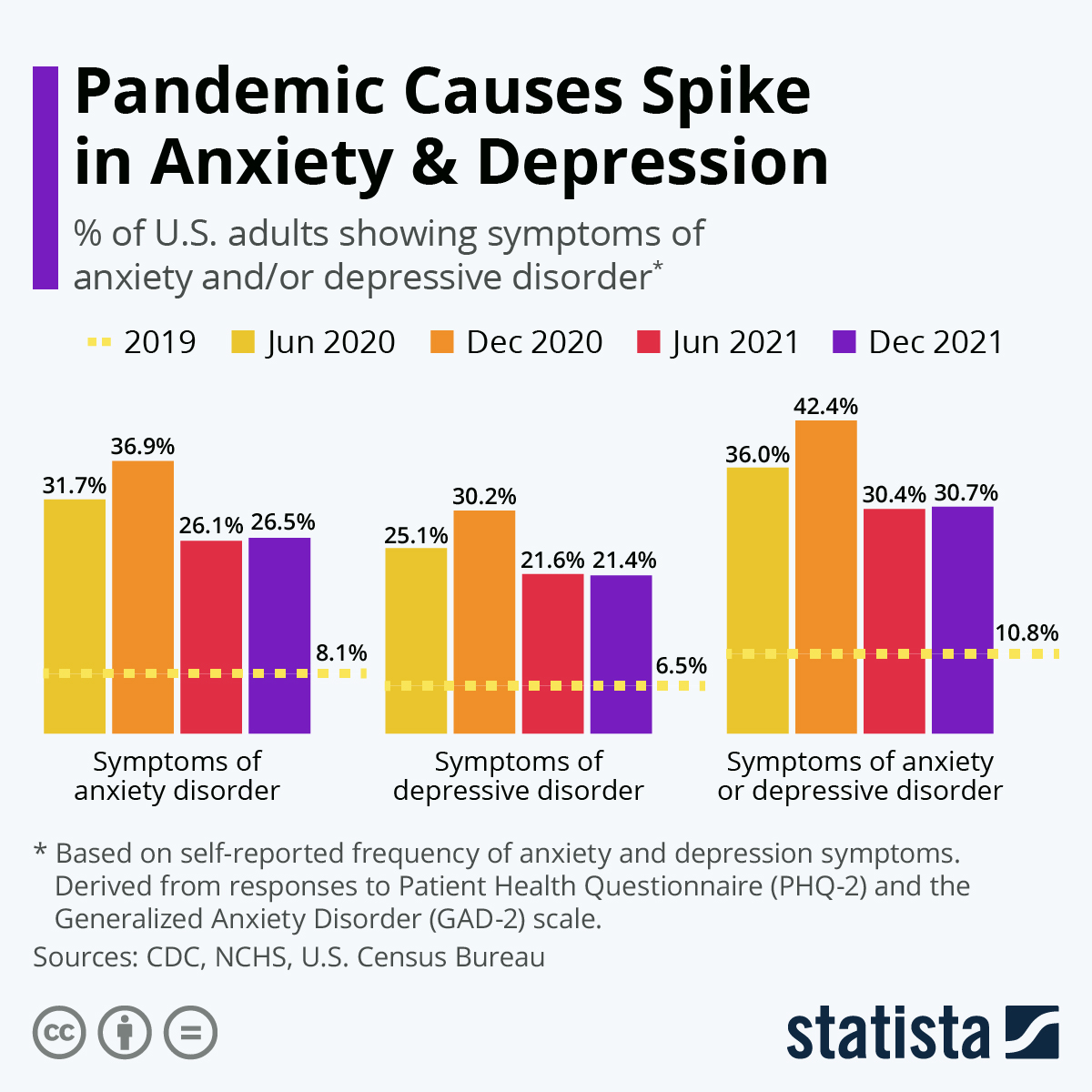Teen Depression Facts
Contents
Are you aware of the basic facts about teenage depression? If you don’t, you need to arm yourself with them ASAP. Although depression is a serious mental illness, it is often overlooked in teens and passed off as erratic hormones which they will soon outgrow.
According to research by JAMA, depression and anxiety in youth doubled during the Covid-19 pandemic compared to pre-pandemic levels. One in every four adolescents worldwide is “experiencing clinically elevated depression symptoms, while one in every five youth is experiencing clinically elevated anxiety symptoms.”
Girls had a higher rate of depression and anxiety, which is consistent with previous research prior to the pandemic, according to the study. While this is a well-known phenomenon, it is frequently overlooked in discussions about mental health.
A case study of teenage depression
You may be wondering what teens have to be depressed about? Most have loving parents who take care of their every need. But being a teenager today is fraught with challenges that many parents never had to face. Check out this TEDx talk by Megan Shinnick of her encounter with teen depression.
Can you tell if your teen is depressed?
You may have missed the signs if you’ve been stressed out with the daily grind to make ends meet. All your free time is probably swallowed by the gazillion chores to manage your home and family. The ‘smart alec’ attitude and hiding out in his room make it near impossible to connect meaningfully with your teen.
Could your teen be suffering from depression rather than the ups and downs of teen life?
Find out more about teen depression
Here are my best book picks to help you educate yourself on the facts about teenage depressions:
- Depression: A Teen’s Guide to Survive and Thrive 1st Edition by Jacqueline B. Toner (Author), Claire A. B. Freeland (Author)
- The Disappearing Girl: Learning the Language of Teenage Depression by Lisa Machoian
- Adolescent Depression: A Guide for Parents (A Johns Hopkins Press Health Book) by Francis Mark Mondimore and Patrick Kelly
As a mom, you cannot bear to see your teen suffering. You are willing to do whatever it takes to help him be happy again. Even if he is seeing a counsellor, you need to help him out of this dark period.
I have a simple but effective list of activities to get your teen to lighten up a little. Check it out below.
Teenage depression statistics
Statistics show that between the ages of 12-17 teenagers often suffer from depression.
Take a look at these 2021 facts about teenage depression:
This indicates that In 2021, about 11 million U.S. adults aged 18 or older suffered from some form of depression.
What is teenage depression
Stanford Medicine defines depression as:
feeling of sadness, despair, or hopelessness that does not go away. In someone with depression, this feeling can last for weeks or months and interfere with the person’s ability to participate in everyday activities. Depression affects mood, outlook, thoughts, and behavior. It also can cause fatigue, irritability, loss of appetite, headaches, and insomnia.
Now, think about your teen and her behavior recently. Does it seem as if he’s not himself but you just can’t put a name to it?
Signs That Your Teen is depressed
Pay close attention to the following behaviors which are warning signs that all is not ok with your teen:
1. Personality Changes and Withdrawing
If you see a big change in your teenager’s personality and he is having a hard time being positive, he could be depressed. How many of these signs apply to your teen? He:
- Never seems to smile
- Is no longer chatty and cheerful
- Refuses to interact with the family
- Isolates himself in her room
- Avoids contact with friends
- Has plummeting grades
- Has stopped all his after-school activities
- Veers between eating too much or too little
2. Anger and Sensitivity
Have you noticed that your teen is overly sensitive to anything that someone says to her?
Is she quarrelsome with her friends? Does he pick fights with them over trivial issues?
Teenagers often hide their sadness through their anger. These angry outbursts could be hiding the bigger problem of depression
3. Signs of teenage depression
If the issue of teenage depression is confusing, watch this You Tube video:
4. Important signs you should NEVER dismiss
These symptoms are often ignored. You need to remember that your teen needs you no matter what he says.
You have to take time out of your busy day to stay in touch with him or you will the signs that he is depressed and needs help.
- Talking about suicide or joking
- Crying too much
- Violent behavior
- Being careless and dangerous
- Smartphone addiction
- Complaining a lot about physical pain that is unexplainable
I bet you’re wondering what the specific facts about depression are that apply to your teen.
Causes of depression in teens
Here are the major causes of teenage depression
- Hormonal changes due to puberty
- Coping with physical and emotional changes
- Increased workload at school
- Failure to cope with academic demands
- Poor grades
- Poor self image and confidence issues
- Social media and the FOMO effect
- Peer pressure
- Bullying
- Personal problems like the divorce
I have a simple but effective list of activities to get your teen to lighten up a little. Check it out below.
1. Improve her diet
Include superfoods, which are loaded with nutrients, in her diet, so that her body functions well. This induces positive feelings and so helps to reduce depression.
Supercharge your teen’s eating with meals that include lots of leafy green veggies, fruit like watermelon and blueberries and proteins like salmon and turkey breast. Read this post which gives you a thorough guide on foods that reduce stress.
2. Start daily exercise
It’s good to get your teen out of his room. Exercise is a great way to relieve stress and depression. Simply being out in the air is an instant mood booster.
Encourage her to take a brisk walk around the neighborhood or walk the dog daily. Even better is gardening which gives a great workout.. Again, being outside is great for her but the act of nurturing a plant helps in the fight against depression.
Yoga is also good. It looks simple but has powerful benefits. The added perk of the deep breathing will be a powerful mood booster to your teen.
3. Encourage her to get creative
A DIY or craft activity such as making this positive word wall shifts the focus from herself to creating something. The right activity will absorb her and the finished product will bolster his confidence.
The shift in focus from himself and all that plagues her to something else also boosts positivity in her.
4. Start a healthy evening routine
Your teen is probably prone to overthinking and this may lead to sleepless nights. You need to start him on a soothing evening routine to help him sleep better. Both the mind and the body function better when they are well rested.
Encourage him to stop using all tech at least 90 minutes before bed. Then he should take a warm shower, have a hot drink like chamomile tea and journal. Focusing on the positive things that happened in the course of the day is key to helping to lift the depression.
Lastly, get your teen to read a spiritual or self help text for at least 10 minutes before bed. Listening to soothing music is another great way to ensure a good night’s sleep.
5. Plan One-on-One Time
Give your teen what she loves most – food, sport or a fun activity that she enjoys. This will get her to open up to you.
- Go to the movies
- Have a movie night at home
- Go out to eat
- Practice driving skills
- Do something they enjoy
- Play board games
Take time out to enjoy your teen’s company. This can help lift your teen’s spirits. Often, all they just want and need is your love and attention.
6. Respond, Don’t React with Anger
Your child is already angry about the world and feeling like no one cares. Reacting with anger could make things worse.
Let him have his explosive anger moments as long as he is not hurting anyone. Once he cools off, he may open up to you.
Just offer him unwavering love and support to make him see that he is not alone, that you are at his side always.
7. Be Their Friend Not Their Parent
You are your child’s rock and he needs to be reminded of this. Often teens struggle to make friends at school and to fit in.
High school is like walking through a minefield today. Teens battle to find out where they fit in and who their real friends are.
Make your teen understand that you are always in their corner no matter what. Let him know that you are a safety net for him.
This will help him trust you and turn to you for help when he needs it.
8. Let them know they have Options
Even when you try to get your teen to open up to you, he may not feel comfortable discussing everything with you.
Give him the option of chatting with a trusted family member or friend.
Suggest a therapist for constructive help if the problem is beyond you or too complex to deal with.
9. Take Time For Yourself
How can you be there for your teen when you are stressed out? You need to practice self-care at least once a week if not daily. Here are a few ideas to try some to help rejuvenate yourself:
- Meditation
- Coffee with a friend
- Reading uplifting books
- Yoga or any exercise
- Journaling
Keep your me-time once a week can help you take a break from everyday life and help you be both a fun and caring mom to your teen.
10. Remind Them That You Love Them
Do this daily. Randomly text them and let them know how much they mean to you. Simply give them a hug and a kiss on the cheek.
Show affection! They need it as much as you do! In return, they will start showing you more affection. Helping you remember how much you mean to your children.
When To Seek Additional Help
If your teen’s depression seems to continue even after trying to reconnect with them then it may be time to seek help from a trained professional.
This does not mean your child is weak. Studies show that some people are more prone to depression than others. Start with speaking to the pediatrician and listen to their recommendations.
Depression and suicide are the leading causes of death in teens. Getting help for your child as soon as possible can help prevent this. Rebecca Suffnes, PhD of Austin Anxiety and OCD Specialists writes about teen depression here. If you are interested in evidence-based therapy for depression, Austin Anxiety has several locations in the Austin area.
Final Word
Yes, life can be stressful for all of us and you may forget that your child needs you on an emotional level too. Sometimes it’s best to step away from the parent role and become their friend. Show your child the love they need.
Do you have any experience of teenage depression? Share your experience in the comments below.




